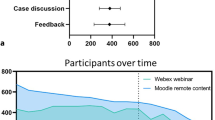Abstract
Objective
The proportion of U.K. medical students applying for psychiatry training continues to decline, whereas, in Somaliland, there are no public-sector psychiatrists. This pilot study assessed the usefulness and feasibility of online, instant messenger, peer-to-peer exchange for psychiatry education between cultures.
Methods
Twenty medical students from King’s College, London, and Hargeisa University (Somaliland) met online in pairs every 2 weeks to discuss prearranged psychiatric topics, clinical cases, and treatment options, completing online evaluations throughout.
Results
Average ratings of the enjoyment, academic helpfulness, and interest of sessions were 4.31, 3.56, and 4.54 (of a maximum of 5), respectively; 83% would recommend the partnership to a friend.
Conclusions
This partnership enabled students on both sides to exploit psychiatry-learning resources at the other’s disposal, outside the standard medical education context, illustrating the benefits to medical students in dramatically different locations of partnership through telemedicine. This pilot study presents an innovative, cost-effective, under-used approach to international medical education.
Similar content being viewed by others
References
Cutler JL, Alspector SL, Harding KJ, et al: Medical students’perceptions of psychiatry as a career choice. Acad Psychiatry 2006; 30:144–149
Syed Sheriff RJ, Baraco AFH, Nour A, et al: Public-academicpartnerships: improving human resource provision for mentalhealth in Somaliland. Psychiatr Serv 2010; 61:225–227
Leather A, Ismail EA, Ali R, et al: Working together to rebuildhealth care in post-conflict Somaliland. Lancet 2006; 368:1119–1125
Finlayson AET, Baraco A, Cronin N, et al: An international,case-based, distance-learning collaboration between the U.K. and Somaliland, using a real-time clinical education website. J Telemed Telecare 2010; 16:181–184
Harden RM, Hart IR: An international virtual medical school(IVIMEDS): the future for medical education? Med Teach 2002; 24:261–267
Hilty DM, Alverson DC, Alpert JE, et al: Virtual reality, telemedicine,web and data processing innovations in medical andpsychiatric education and clinical care. Acad Psychiatry 2006; 30:528–533
Miriam J, Szeftel R, Sulman-Smith H, et al: Use of tele-psychiatry to train medical students in developmental disabilities.Acad Psychiatry 2011; 35:268–269
Department for International Development: Guidance on Usingthe Revised Logical Framework (online); retrieved 06/12/2011; http://www.dfid.gov.uk/Documents/publications1/how-to-guid-rev-log-fmwk.pdf
Author information
Authors and Affiliations
Corresponding author
Rights and permissions
About this article
Cite this article
Keynejad, R., Ali, F.R., Finlayson, A.E.T. et al. Telemedicine for Peer-to-Peer Psychiatry Learning Between U.K. and Somaliland Medical Students. Acad Psychiatry 37, 182–186 (2013). https://doi.org/10.1176/appi.ap.11080148
Received:
Revised:
Accepted:
Published:
Issue Date:
DOI: https://doi.org/10.1176/appi.ap.11080148



